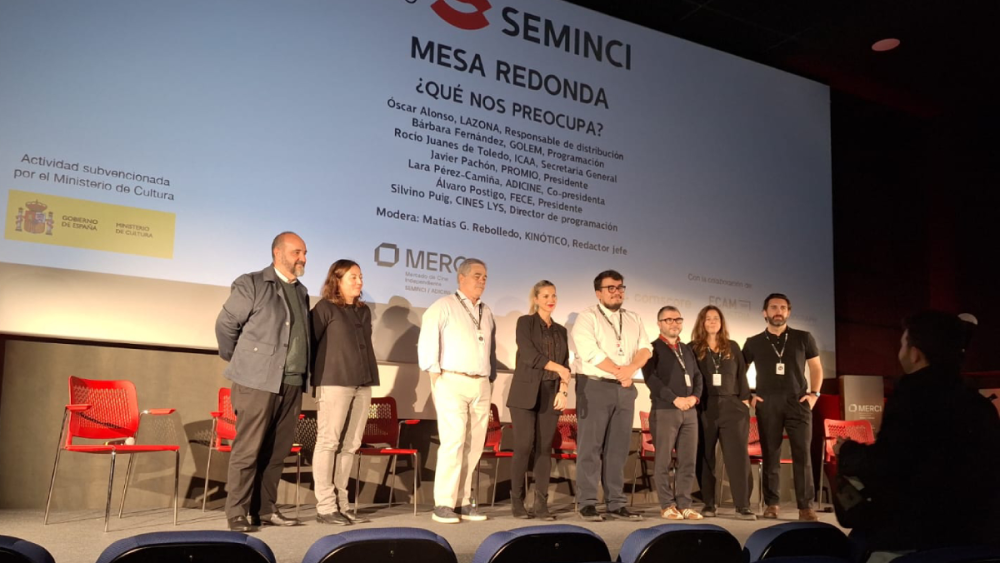Copyright Variety

The defining vibes of Valladolid’s fifth edition of Merci market were set at its flagship roundtable, “¿Qué nos preocupa?” (“What’s Worrying Us?”), where Spain’s indie distributors and exhibitors mapped a survival playbook for arthouse films. Running Oct. 29–31 at Valladolid’s Broadway Cinemas and co-organized by Seminci and distributors’ association Adicine, Merci drew roughly 200 programmers, exhibitors, distributors, platform buyers and TV commissioners and screened 27 late-2025-2026 titles. Comscore Movies Spain had previously supplied a sobering backdrop: as of Sept. 30, 2025, Spanish theatrical admissions were tracking 3% down year-on-year, while the international market rose 4%. October: 70 New Cinema Releases October alone crammed 70 new releases into Spanish cinemas — a choke point that buries indie titles before reviews, campus outreach and social traction can add momentum. Comscore also tallied a snapshot of 2025 performance for the 20 Adicine-member distributors, nearly 99% of Spain’s indie distribution sector: a €38 million ($43.8 million) gross box office from 5.9 million admissions off 202 new releases, for a 12% market share. Moderated by Kinótico’s editor Matías G. Rebolledo, the session speakers were LaZona Pictures’ Óscar Alonso, Golem programmer Bárbara Fernández, Cines Lys’ programmer Silvino Puig, ICAA secretary general Rocío Juanes de Toledo, Adicine co-president Lara Pérez Camiña, PROMIO president Javier Pachón and FECE president Álvaro Postigo. Stronger Education Pipelines Indie distributor Alonso flagged the “sleep killer” — a glut of titles that makes misdating fatal — and pushed for stronger education pipelines to reach new audiences. Golem’s Fernández warned that fixed costs are colliding with scanter box office. Puig, recalling the pre-digital era’s five-to-seven weekly openers, said the programming job itself has become a stress test. Pachón cited box office concentration and a waning appetite for exploration, compounded by insufficient incentives for theaters. Postigo described a “brutally unstable” environment, pointing to a disordered global release calendar and U.S. studio turbulence; his prescription: E.U.-level coordination on windows and market order. ICAA: Bigger Institutional Support for Exhibition-Distribution From the institutional side, Juanes de Toledo said the ICAA’s new four-year strategic plan will tilt support from production toward distribution, exhibition and audience renewal — scaling Cine Sénior and Cine Escuela programs, routing schools outreach through non-profit intermediaries and laying groundwork for a long-awaited State Council to codify best practices. Collaboration emerged as a key opportunity at Merci. In a study presented Oct. 31, “Collaborative Models for Exhibitors,” consultant Jon Barrenechea in partnership with Europa Cinemas reported that cinema subscription schemes are delivering a net positive on admissions and exhibitor revenue, acting as always-on marketing that builds community, incentivising programming diversity and strengthening ties both among exhibitors and between exhibitors and distributors. Barrenechea pointed to three concrete playbooks: Cineville, an associative model with cinema ownership that counts with 135,000 subscribers across the Netherlands, Belgium, Germany and Austria and works with 180 cinemas; Mubi Go’s ticket program, operative in the U.S., U.K., Ireland and Germany, partnering with 260 cinemas and logging 350,000 tickets redeemed since its 2018 launch; and Austria’s Nonstop, launched in 2023 and operating in 29 cinemas nationwide via a subscription card model with more than 10,000 subscribers. Some takeaways from Barrenechea’s speech: Make collaboration long-term and sustainable; expect subscriptions to grow as consumers default to them, and localize branding, pricing and structure per market. For their part, Letterboxd’s Ella Kemp — speaking for a platform used by more than 23 million cinephiles globally — mapped how taste-communities can offer bookers a practical bridge from online chatter to local scheduling. An Unmissable Fall Date for the Industry “In this fifth edition, Merci has consolidated itself as an unmissable fall date for the industry, proven by nearly 200 attendees — about 30% up on last year,” said Adicine’s Pérez Camiña. The event’s pull is fuelling calls for a second annual meet: “Exhibitors and TV and platform executives have asked for a second edition, and at Adicine we agree it would be beneficial. However, as of today we cannot confirm whether this will be possible — or where.” Concrete incentives landed on Merci closing gala, when La Meseta Distribución unveiled new distribution awards recognizing the best promotional campaigns for auteur film releases: €10,000 ($11,516) to Sideral for Kristen Stewart’s “The Chronology of Water,” $5,758 each to Avalon and MadAvenue for Júlia de Paz’s “The Good Daughter” and Elástica and Revolutionary for Hlynur Pálmason’s “The Love that Remains,” plus a special mention to Beta Fiction Spain for Daniel Sánchez Arévalo’s “Rondallas.” The initiative is backed by the Junta de Castilla y León with Ministry of Culture support. Also, Valencia’s Cines Lys programmer Silvino Puig received an Honorary Merci Award.



